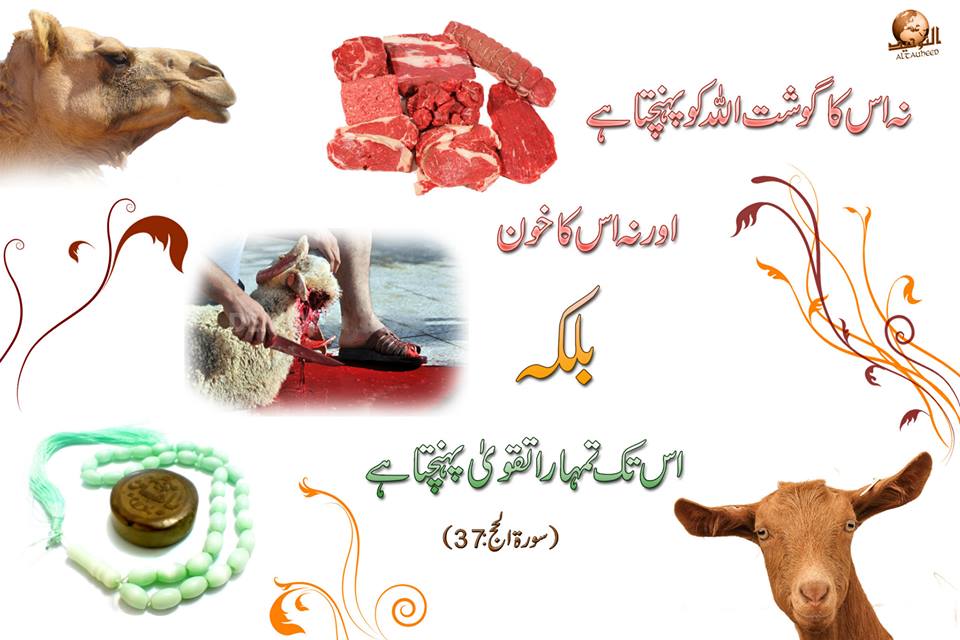Qurbani (Udhiyah) is one of the most religious rituals of Islam that every financially stable Muslim needs to perform for the sake of Allah Almighty. Qurbani or Udhiyah as it is widely referred to is a significant religious practice in Islam performed all over the world by billions of Muslims on Eid-ul-Adha and the two days following it. For the sake of clarity and to inform those who are not familiar with the concept, it is the practice of slaughtering an animal, usually a sheep, goat or cow, as an offering to Allah. Allah says:
إِنَّ اللَّهَ يُدْخِلُ الَّذِينَ آمَنُوا وَعَمِلُوا الصَّالِحَاتِ جَنَّاتٍ تَجْرِي مِن تَحْتِهَا الْأَنْهَارُ يُحَلَّوْنَ فِيهَا مِنْ أَسَاوِرَ مِن ذَهَبٍ وَلُؤْلُؤًا وَلِبَاسُهُمْ فِيهَا حَرِيرٌ
“Indeed, Allah will admit those who believe and do the righteous deeds, (to) Gardens flow from underneath it the rivers. They will be adorned therein with bracelets of gold and pearl, and their garments therein (will be of) silk.” (Surah Al-Haj 22:23)
Saying the Takbeer at the time of sacrifice is paramount to ensuring a successful and acceptable Qurbani. Bismillahi Allahu Akbar (in the name of Allah, Allah is Great) are the correct words to say at that moment. It is not necessary to say these words out loud.
Conditions and Rules Regarding Qurbani (Udhiyah)
Below mentioned are some conditions and rules regarding Qurbani (Udhiyah) that we all should know about:
- Qurbani must be performed on the 10th, 11th, and 12th of Zil Hajj.
- It should be one of the An’aam classes of animals, which are camels, cattle, sheep, and goats. Allah Almighty says in the Noble Quran: “And for every nation, We have appointed religious ceremonies, that they may mention the Name of Allah over the beast of cattle that He has given them for food.” (Quran, 22:34)
- The animal should have reached the required age, which is six months for a lamb, one year for a goat, two years for a cow and five years for a camel.
- An individual who is eligible to pay Zakat must perform Qurbani for himself and every family member including children.
- Animals for slaughtering should be free of any kind of fault. Holy Prophet (SAW) said: “There are four that will not do for sacrifice: a one-eyed animal whose defect is obvious, a sick animal whose sickness is obvious, a lame animal whose limp is obvious and an emaciated animal that has no marrow in its bones.” (Sahih Al-Jami)
- If an animal has been selected for sacrifice, it is not permissible to sell it or give it away, except in exchange for one that is better.
- The animal must be alive at the time of slaughter that is the animal being sacrificed has to be alive and it’s preferable for it to be awake.
- The person who is making the sacrifice must be a Muslim and has to invoke the name of Allah by saying Bismillah Allahu Akbar at the time of the sacrifice.
- The animal shouldn’t be slaughtered when it’s hungry and also water should be offered to the animal before the time of slaughter.
- Animals should be purchased a few days before the slaughter, and they must be cared for, fed and nurtured before their sacrifice.
- A person who is giving Qurbani should present at the time of slaughtering an animal.
- Animals should be slaughtered quickly with a sharp knife, so they do not suffer. The knife is not to be sharpened in front of the animal though, and no animal should be slaughtered in the presence of another animal.
- Slaughtered animals are not to be skinned until completely cold.
- It is disliked or considered Makruh for the one who intends to perform the sacrifice to remove any hair or nails from his body from the 1st of Zil Hajj until he performs the sacrifice. It is mentioned in one of Hadith of our beloved Prophet Muhammad (SAW): “When you see the moon of Zil Hajj and you intend to perform the sacrifice then don’t remove any of your hair or nails.” (Muslim)
- At the end divide the meat into three is one third for consumption, one third to be given as gifts and one third to be given in charity. Meat is then distributed among neighbours, family and poor people.
How does Ehsaas give your Qurbani?
Qurbani takes place after offering the Eid prayer mostly on the 10th of Zil Hajj and two days following it. In the Holy Quran, Allah Almighty says:
فَصَلِّ لِرَبِّكَ وَانْحَرْ
“Therefore turn in prayer to your Lord and sacrifice (to Him only).” (Surah Kauthar, 108:2)
With Eid-ul-Adha just a month or so away, it is important that Muslims who will be performing Qurbani for the first time this year get it done properly. May Allah SWT give us the opportunity to perform Hajj next year Inshallah. May he accept our sacrifice as a testament to our faith and belief. Ameen!
